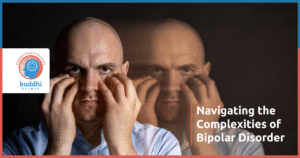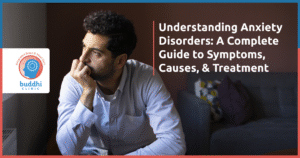Introduction
Anxiety is a normal reaction to stress, yet when it is overwhelming and chronic, it will disrupt daily functioning. Anxiety disorders rank among the most prevalent mental illnesses, targeting millions of individuals globally. It is imperative to know about symptoms, causes, and treatment of anxiety disorders in order to cope and enhance mental health.
What Are Anxiety Disorders?
Anxiety disorders are a collection of mental illnesses that are defined by excessive, persistent worry, fear, or panic without an adequate stimulus for such a response. Generalised anxiety disorder, panic disorder, social anxiety disorder, and phobias are a few of the anxiety disorders. Anxiety disorders have a serious effect on the quality of life of the individual, the interpersonal relationships of the individual, and on overall health.
Symptoms
Anxiety disorders manifest themselves in many forms, both physical and mental. Some of the most common symptoms include:
- Excessive worry or fear
- Restlessness or feeling keyed up
- Racing heart
- Feeling breathless
- Difficulty concentrating
- Muscle tension
- Sleep disturbance
These symptoms are debilitating and range from person to person. Some may only have minor anxiety that can be managed, but others may have severe symptoms that disrupt their function on a day-to-day basis. It is important to understand that anxiety disorders are not fleeting episodes of fear or worry but chronic and pervasive conditions that must be treated and managed.
Causes
The aetiology of anxiety disorders is multifactorial and generally an intermixture of the following factors:
- Genetics:
Anxiety disorders have been found to be hereditary, and therefore there is a genetic factor. Patients with a family history of anxiety disorders are likely to have them.
- Brain Chemistry:
Neurotransmitter imbalances, chemicals that carry messages in the brain, may lead to anxiety disorders. Some neurotransmitters that manage mood and anxiety are serotonin, dopamine, and norepinephrine.
- Life Experiences:
Traumatic or stressful experiences, including abuse, loss, or major life changes, may lead to anxiety disorders. Chronic stress, whether in the workplace, in relationships, or otherwise, may also cause the onset of anxiety.
- Medical Conditions:
Some medical conditions like thyroid disorders, heart diseases, and chronic diseases can cause or exacerbate symptoms of anxiety. These medical conditions must be taken into account at the time of diagnosis and treatment of anxiety disorders.
- Environmental Factors:
Home, social, and cultural environments may influence the development of anxiety disorders. For instance, experiencing a stressful environment during childhood or exposing oneself to extreme social pressure can elevate one’s risk for developing anxiety.
Treatment
Treatment for anxiety is usually a multi-dimensional process modified according to individual needs. Evidence-based interventions may include:
- Psychotherapy:
Cognitive-behavioural therapy (CBT) is an effective and well-established treatment for anxiety disorders. CBT allows individuals to learn to recognise and challenge negative patterns of thinking and behaviour that perpetuate anxiety. Individuals are trained in coping skills and strategies through therapy to develop more control over anxiety.
- Medications:
Some medications are available that can be used to alleviate anxiety disorders. Antidepressant medications, for example, selective serotonin reuptake inhibitors (SSRIs), are often used to stabilise mood and decrease anxiety. Anti-anxiety medications, such as benzodiazepines, have a temporary soothing effect but are generally not the first choice for use because there is a dependence risk. Beta-blockers also may be taken to alleviate somatic symptoms of anxiety, e.g., accelerated heart rate.
- Lifestyle Modifications:
Adopting healthy lifestyle changes can make a big difference in anxiety control. Eating a healthy diet, exercising daily, and sleeping well can lead to wellness and minimize symptoms of anxiety. Mindfulness activities like meditation and yoga will ensure the person stays alert and can handle stress. Consumption of caffeine and alcohol must be lessened, and items that induce more anxiety must be avoided.
- Support Systems:
Support from a good support system can assist in making a difference in managing anxiety. Having a connection with friends, family, or support groups can form an emotional buffer and reduce loneliness. Connecting and having experience and coping strategies with individuals who understand may assist in a very big way.
- Self-Help Strategies:
Besides professional counselling, self-help strategies may be used to cope with anxiety. Some of these are journaling, relaxation, leisure activities, and goal setting with realism. Recognition and cognitive reappraisal of dysfunctional thinking patterns might also prove a useful self-help strategy.
Why Choose Buddhi Clinic for Your Anxiety-Related Disorders?
At Buddhi Clinic, we are passionate about empowering lives with empathetic, holistic, and individualised mental health services. Our compassionate team of expert professionals is committed to delivering evidence-based treatments in a way that addresses your unique needs. Be it anxiety, depression, stress, or relationship issues, we provide a warm and non-judgemental environment for healing and transformation.
What do we do differently?
- Expert Care: Our therapists and counsellors are trained in the most up-to-date therapeutic methods, so you get the best care.
- Holistic Approach: We treat not only the mind but also the emotional and social dimensions of well-being.
- Personalised Plans: Each person is different, and so are our treatment plans, tailored to help you flourish.
- Convenient Online Sessions: Get therapy from home, making mental health care convenient and hassle-free.
Conclusion
Anxiety disorders are widespread but can be treated with effective care and management. Knowledge about symptoms, aetiology, and treatment is the key to enhanced mental well-being and peace of mind. When anxiety is hindering your social relationships, profession, or life, professional intervention can help. Keep in mind that seeking professional assistance is an indication of courage, and treatment options are efficacious to lead healthy and enjoyable lives.
FAQs
1.What are the most prevalent types of anxiety disorders?
Some of the most prevalent ones are Generalised Anxiety Disorder (GAD), panic disorder, social anxiety disorder, and specific phobias.
2.What are the most significant symptoms of anxiety disorders?
Some of the most common symptoms are excessive worry, restlessness, racing heart, trouble concentrating, muscle tension, and disturbance of sleep.
3.Can anxiety disorders be treated?
Yes, anxiety disorders can be treated effectively by psychotherapy, medication, and changes in lifestyle.
4,What causes anxiety disorders?
In addition to genetic, biological, environmental, and psychological factors, a combination of these can also lead to the onset of anxiety disorders.
5.When do I need to consult a professional for anxiety?
If anxiety is chronic, debilitating, and interfering with daily functioning, then it is necessary to consult a professional.






